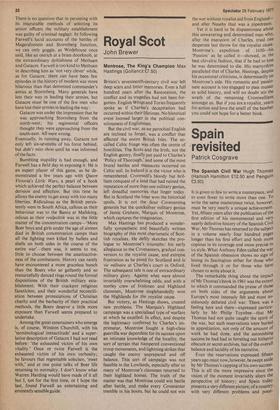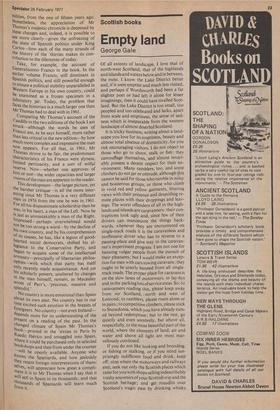Spain revisited
Patrick Cosg rave
The Spanish Civil War Hugh Thomas (Hamish Hamilton £12.50 and Penguin £3.50) It is given to few to write a masterpiece, and to even fewer to write more than one. To write the same masterpiece twice, however, must be very nearly a unique achievement. Yet, fifteen years after the publication of the first edition of his monumental and very nearly definitive history of the Spanish Civil War, Mr Thomas has returned to the subject in a volume nearly four hundred pages longer than his first effort and both more copious in its coverage and more precise In its style. What Anthony Eden called the war of the Spanish obsession shows no sign or losing its fascination either for those who lived through it or for those who have chosen to write about it.
The remarkable thing about the impact of Mr Thomas's book in 1961 was the extent to which it commanded the praise of those on both sides of the arguments about Europe's most intensely felt and most assiduously debated civil war. There was a feeling here and there—expressed particularly by Mr Philip Toynbee—that Mr Thomas had not quite caught the spirit of the war, but such reservations were buried in appreciation, not only of the amount of work he had done, and the astonishing success he had had in ferreting out hitherto obscure or secret archives, but of the overall balance and lucidity of his narrative.
Even the reservations expressed fifteen years ago must now, however, be swept aside by Mr Thomas's capping of his own success. This is all the more impressive since the vision of the moment invariably alters the perspective of history; and Spain today presents a very different picture, of a country with very different problems and possi bilities, from the one of fifteen years ago. Nonetheless, the appreciation of Mr Thomas's majestic chronicle is deepened by these changes and, indeed, it is possible to see more clearly—given the unfreezing of the state of Spanish politics under King Carlos—how each of the many strands of the history of the 'thirties makes its contribution to the dilemmas of today.
Take, for example, the account of Generalissimo Franco in the book. In the
earlier volume Franco, still dominant in Spanish politics, and still powerful enough to ensure a political stability unparalleled in Western Europe in his own country, could be examined as a frozen specimen in a laboratory jar. Today, the problem that faces the historian is a much larger one than rvl r Thomas had to deal with in 1961.
Comparing Mr Thomas's account of the Caudillo in the two editions of the book I am struck—although the words he uses of
Franco are, as he says himself, more rather than less critical in the new edition—by how Much more complex and impressive the man now appears. For all that, in 1961, Mr Thomas strove to be fair, the predominant characteristics of his Franco were slyness, limited pertinacity, and a sort of wilful reserve. Now—whether one approves of him or nor—the wider capacities and larger visions of the man are apparent to the reader. This development—the larger picture, yet the harsher critique—is all the more inter esting since Mr Thomas is a very different man in 1976 from the one he was in 1961. For all his dispassionate scholarship then he
Was, in his heart, a man of the Left. Now he is Just as unmistakably a man of the Right. Impressed perhapsoverwhelmed would t be too strong a word—by the decline of hts.own country, and by his comprehension
of its causes, he has, like a legion of good hearted social democrats, shifted his allegiance to the Conservative Party, and
begun to acquire some of the intellectual armoury—principally of libertarian philos°Pbles—with which that party has itself Only recently made acquaintance. And yet h. is scholarly powers, unaltered by changes
in the man himself, remain, as Macaulay wrote of Parr's, 'precious, massive and snlendid.'
No country is more emotional than Spain about its own past. No country has in our time excited such emotion in the breasts of
foreign No country—not even Ireland—
depends more for its understanding of the Present on a reading of the past. In the
Changed climate of Spain Mr Thomas's
book—printed in the 'sixties in Paris by Ruedo 1 berico and smuggled into Spain, Where it could be purchased only in selected
bookshops and then from under the counter —will be openly available. Anyone who
knows the Spaniards, and how jealously they resent foreign interpretations of themselves, will appreciate how great a compli ment it is to Mr Thomas when I say that it Will sell in Spain in its thousands; and that
thousands of Spaniards will learn much from it.



































 Previous page
Previous page